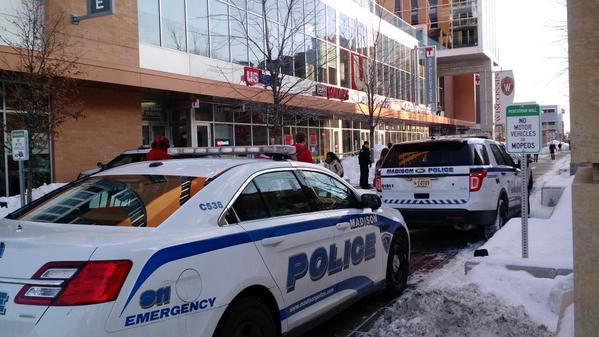Amid a national shortage of police officers, the Madison Police Department is hosting a law enforcement recruitment fair starting April 12. While more officers on the streets was, until very recently, preached as a social good, that is starting to change. With the murder of George Floyd in May 2020 and the litany of instances of police violence before that — including the tragic deaths of Michael Brown, Breonna Taylor, Dontre Hamilton and Natasha McKenna — more scrutiny is now placed upon police recruitment efforts.
Despite the notion that increased police presence is the answer to law enforcement shortages, hiring more officers is neither financially nor socially efficient.
First, it is worth acknowledging the existence of studies which reveal there is genuine utilitarian benefit to increased police presence. According to the National Bureau of Economic Research, every new officer on the force prevents approximately 0.1 homicides, and investments in police officers can save a life at a cost of between $1.3 to $2.2 million. The U.S. government values a human life at about $10 million, according to NPR. It’s a cold, economically efficient exchange. With this, there is a correlated decrease in major criminal activity.
Unsurprisingly, the study from the National Bureau of Economic Research notes these benefits are racially biased. For cities with relatively large Black populations the life-saving and crime-reducing effects go down, and quality of life offenses — such as drug- or gang-related offenses — go up. This returns us to the American reality, where the police are still an institution mired in racism and inefficiency. This problem has been allowed to fester for decades and cannot be easily fixed.
To MPD’s credit, there have been steps to reduce such biases in their day-to-day operation. It is laudable that they choose to face the reality of American police history head on by educating officers on the slave patrols that formed the basis of our law enforcement system, as well as providing in-depth classes on implicit biases, according to Wisconsin Public Radio.
But, compared to other cities with populations over 250,000, MPD ranks in the 30th percentile for the arrest rate for low-level offenses and in the fifth percentile for racial disparities in drug arrests. And, despite ranking in the 72nd percentile for homicides solved, MPD ranks in the 36th percentile for their overall approach to law enforcement.
Though people of different races have similar rates of infractions, Black people in the Madison area are more than 10 times more likely to be charged for low-level offenses than white people.
This may seem like a Catch-22 — either more officers are hired and increase safety or fewer officers are hired and ensure better treatment of people. Outside of actual revolutionary changes in law enforcement, however, increasing police efficiency without increasing police presence is simply a question of diffusion of responsibilities.
Currently, American police are on-call for drug crimes, mental health checks, problems with homelessness, domestic disturbances and much more. The list of MPD’s Standard Operating Procedures lists instructions for 95 different operational processes. Even with a six-month comprehensive training course, this is a lot to ask from one government agency experiencing an officer shortage.
Not only is the incredible diversity of incidents police are required to handle a strain on their ability to properly specialize, but it is a burden on the efficiency and safety of the whole system. Departments frequently find themselves understaffed. This understaffing, and the overtime that can follow from it, increases incidents of officer misconduct and violence, especially during back-to-back night shifts after days in court.
Defunding the police does not mean stripping them of money but rather reallocating the financial resources from law enforcement into public safety. In Madison, law enforcement receives the most funding of any government agency at more than $85 million annually, according to the 2023 Executive Operating Budget. Most of this money goes toward salaries, wages and benefits for staff.
In February 2022, the Madison Common Council accepted a three-year federal grant of $750,000 to hire six new police officers, according to the Wisconsin State Journal. The move was criticized for how it might impact the future of reconstructing public safety in Madison. Adding $750,000 to the community development sector would increase their spending by almost 4%. These funds could be used to hire community counselors who work to increase trust between the community and government. Adding $750,000 to the civil rights department would be a 32% increase, which could be allocated toward comprehensive racial equity training.
‘Driver’s licenses for all’ is necessary starting point to enable broader immigration reform
As an extension of Madison police, fire and health services departments, the Madison CARES Program reduces officer workloads to better respond to mental health crises. In nonviolent mental health emergencies, a mental health professional and a response team are dispatched to address the situation. This team allows quicker and easier responses to crises like these without putting a strain on officer efficiency. This is a great example of what proper allocation of public funds can contribute to safety without hiring more officers.
Policing in the U.S. is problematic, but it doesn’t have to be. American police don’t just get called when there is a clear danger to public or personal safety — they get called for every unusual and trivial occurrence from fireworks to abandoned cars to pets on the loose. None of these things require the level of force they are trained to use or the level of money spent to equip them.
Defunding the police would not only lessen the workload on each individual officer but could positively impact communities through public resources. Otherwise, America will continue to be faced with inequitable public safety outcomes.
Jeremiah Frodl ([email protected]) is a senior studying communication.




















